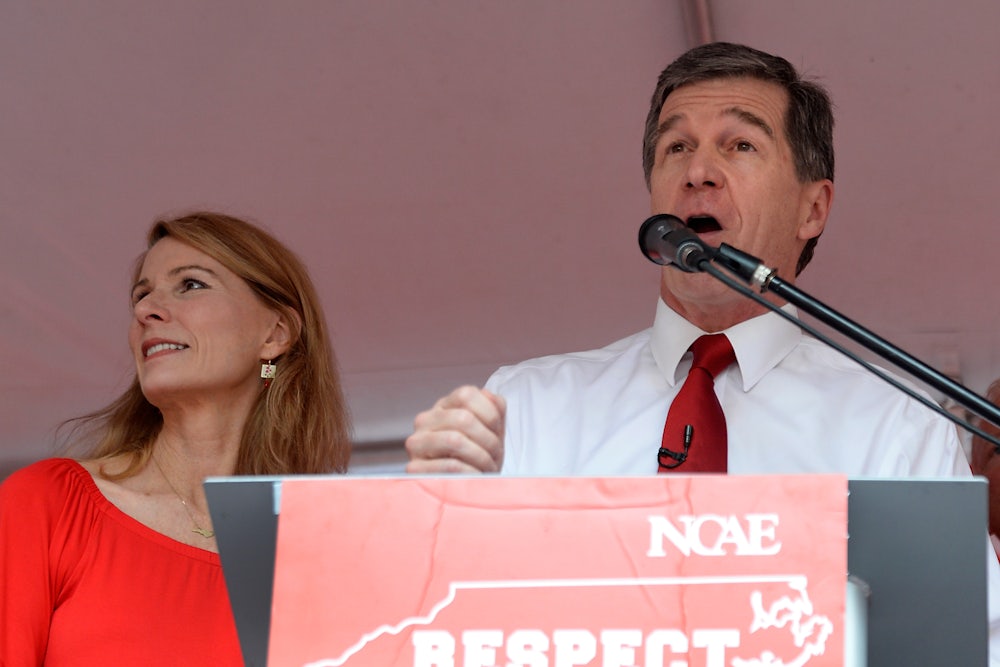The Regional Greenhouse Gas Initiative, or RGGI, is something of a Rorschach test for climate activists and policy wonks. For incrementalists or politicians hoping to do something about the climate crisis (as long as it can’t be termed anti-industry), the multistate cap-and-trade program that debuted in New England over a decade ago is a godsend. But for marginalized communities across the South—already on the front lines of environmental destruction, up to their necks in climate half-measures and empty promises—there’s little to cheer in this market-based approach. And as North Carolina mulls joining the RGGI, these two groups find themselves on a collision course.
On Tuesday, the Tar Heel State’s Environmental Management Commission will hold a full vote on joining the RGGI. The vote follows a recommendation from the commission’s Air Quality Committee, following a petition filed by the Southern Environmental Law Center in June.
As the petition explained, joining the RGGI would entail placing “a declining cap on CO2 emissions from the electric power sector in North Carolina with emissions allowances linked to the RGGI market.” If the Environmental Management Commission clears the way, North Carolina would be on a path to becoming the second Southern state to join the RGGI’s ranks, behind Virginia, which joined in 2020. Above the Mason-Dixon line, Pennsylvania, led by Governor Tom Wolf, is also considering joining the initiative and would be the only fossil fuel–dominant state in the group—a big reason why Wolfe’s Republicans colleagues in the state legislature are opposing the measure.
North Carolina is not an oil-rich state. Joining the RGGI would, at the industry level, likely only result in the state’s remaining coal plants being targeted for eventual closure. This would therefore seem an easy sell for a state in desperate need of updating its climate and environmental objectives, which is why the movement to join the RGGI is co-signed by the Sierra Club, Clean Air North Carolina, and the N.C. Coastal Federation, among others, including, behind the scenes, the office of Democratic Governor Roy Cooper. Barring a sudden change of heart, Tuesday’s vote is likely to confirm the RGGI plan.
Yet while joining the RGGI may indeed offer a number of benefits, a meaningful reduction in carbon emissions does not appear to be among them. And coming on the heels of the state’s recent controversial Farm Act, the proposal is prompting concern among several leaders in the state’s Black and Native communities, who say they are rarely consulted on environmental policies despite their communities being disproportionately affected.
“If you look at some of the hard data that’s outside of RGGI reports, it is questionable how much it’s been able to change any of the variables around climate change because of the way it is enacted,” Donna Chavis, a citizen of the Lumbee Tribe and a senior climate campaigner for Friends of the Earth, told me.
Reporting for Vox four years ago, David Roberts laid out how the RGGI, an idea first proposed in 2003 by then–Republican governor of New York George Pataki, sets a declining cap on the amount of greenhouse gases that large-scale energy operations are allowed to emit, with all operations reporting to the initiative every three years. The price of the subsequent allowances (effectively pollution permits) is set at auction and holds steady across the board for all energy producers, with a secondary market for trading these allowances.
While its model and function were hailed as revolutionary in the early years, the RGGI is your standard market-based solution to emissions. The states, like their federal counterpart, do not want to take on the direct responsibility of actively closing down their fossil fuel operations, so instead they have designed a regulatory oversight system that will, hopefully, steadily price out any future carbon-based energy models.
But as Roberts pointed out back in 2017, this plan does little to actually drive down emissions rates. Breaking it down for readers, Roberts showed that the RGGI’s overall economic impact at the time amounted to 0.02 percent of the involved states’ gross domestic product. And because of the RGGI’s limited scope, its overall regulatory bounds covered just 1.4 percent of all U.S. emissions. In fact, between 2009 and 2014, the RGGI’s cap “didn’t force any emission reductions,” Roberts wrote, because of how high the cap was set. Although that cap has been steadily lowered in subsequent years, many environmentalists still feel the RGGI’s impact is more cosmetic than concrete.
The RGGI, said Bobby Jones, the 70-year-old founder of the Down East Coal Ash Environmental and Social Justice Coalition, who lives in the majority-Black city of Goldsboro, “is just a fancy way of saying, ‘We pay to pollute.’” Jones has two problems with the RGGI. The first is the way that Cooper’s office and other environmental groups have leveraged the RGGI’s image to make it out as a viable avenue toward mitigating global warming and the accompanying effects—effects felt particularly hard by those in the eastern part of the state, like Goldsboro, where flooding from hurricanes has left communities in a constant state of recovery. What’s needed is more direct action, centered around funding frontline communities’ ability to recover and withstand future storms and transitioning away from fossil fuel–centered energy models. The cap-and-trade model, however, simply encourages the further reliance on gas. “If we had equity, in the best of worlds, it might work,” Chavis said. “But in the way that is done in the United States, we really are in a situation where the energy companies are able to continue to pollute.”
Jones’s second criticism involves the lack of coordination between Governor Cooper’s office and environmental justice groups and their communities before making similar decisions in the past. “They had already started a lot of discussion about RGGI before they let our people become aware of it,” Jones said. “And that’s kind of what happens in BIPOC communities and in poor white communities—they make their decisions, and we’re the last ones to know.”
Cooper’s general track record with environmental justice has been patchy. In 2018, the governor co-signed the Atlantic Coast Pipeline, which, prior to its cancellation last summer, was slated to run through a number of minority communities and end in Lumbee territory. More recently, he opted to sign the 2021 Farm Act, which activists criticized for helping the agricultural industry promote environmentally fraught biogas technology. As a result, Jones, Chavis, and others like Naeema Muhammad, the organizing co-director of the North Carolina Environmental Justice Network, question the second-term executive’s true commitment to BIPOC communities.
All three organizers were still smarting from the Farm Act decision, made official the first week of July, when I spoke to them recently. The bill streamlines the ability of agricultural operations to operate toxic methane-emitting biogas technology, currently being pushed hard by ag giants like Smithfield and its subsidiaries, such as Murphy-Brown. Smithfield maintains dozens of operations throughout the eastern part of the state and desperately wants to cash in on the remaining years of American gas dependency. But biogas comes with a cost, namely in the form of air and water pollution, as it draws its energy source from large lagoons of animal waste.
“Every time I hear ‘renewable gas,’ it pisses me off, man,” Jones said. “When you look at the whole process that they’re using with those digesters and see what little methane that they’re extracting while a huge volume is going into the air—it’s bullshit, excuse my language. It’s just a travesty. These people can’t even go to their house, take refuge in their homes, in their churches. But somebody else is making a decision that’s affecting their lives and just doing it at the stroke of a pen.”
Last Thursday, according to Muhammad, after members in her New Bern community requested a direct meeting with Cooper to discuss the ways they would be affected by the legislation’s explicit approval of biogas operations, Cooper’s office instead dispatched a representative to meet with the Environmental Justice Network and several allied organizations. The groups, as well as the community members who joined, were irked that Cooper “didn’t have the nerve to show up,” Muhammad said. At the meeting, they called the Farm Act a “death warrant,” in Muhammad’s words. “[Cooper] ran on the environmental justice platform, but he’s not living up to it at all,” Muhammad concluded. “He’s selling us down the drain.”
In response to The New Republic’s request for comment, Ford Porter, spokesperson for Governor Cooper, wrote in an email, “The RGGI petition is one option the state can use to get to net zero carbon emissions while creating funding for important environmental justice issues that affect marginalized communities.” Regarding the Farm Act, which Porter acknowledged as including “some concerning provisions,” he cited the bill’s bipartisan support in the General Assembly, adding that “the Governor signed it to provide certainty and resources for one of North Carolina’s most important industries.”
It’s easy to write Cooper a pass for any one of the Atlantic Coast Pipeline, RGGI, or Farm Act decisions. Dealing with a Republican-held General Assembly as oppositional as this one—only a month ago, it bizarrely spiked Cooper’s pick to head the state Department of Environmental Quality—makes Cooper’s job as governor difficult; he must pick his battles, in terms of when to deploy his veto and leverage his power and influence. Yet each of these policies could be counted among the most important decisions for the state’s near- and long-term climate future since he took office. And it’s for this reason that, when taken together, it becomes difficult to ignore the pattern being established by Cooper. While the RGGI may seem like a symbolic step toward coordinated climate policy, for Black, Latinx, Native, and poor communities in the state it also represents the continued sidelining of environmental justice issues in the governor’s broader agenda.
The organizers I spoke with all recognized that Cooper is not operating from a position of political strength. He does not get to set the agenda for what the General Assembly will take up and send his way. He does, however, have the power to reject measures like the Farm Act, even if the legislature, when acting in a bipartisan fashion, has the ability to overturn it. Cooper’s office also has the ability, and responsibility, to consult with communities like the ones Chavis, Muhammad, and Jones represent and then update its legislative and executive priorities accordingly. Had his office truly listened in the past, it might have thrown up a few roadblocks to items like the ACP and the Farm Act. Then perhaps the RGGI, clearly the lesser of the three evils, would have felt more tolerable to marginalized communities. Instead, the governor went for the hat trick and now will have to spend the remaining three years of his term trying to mend trust that never should have been broken in the first place.








